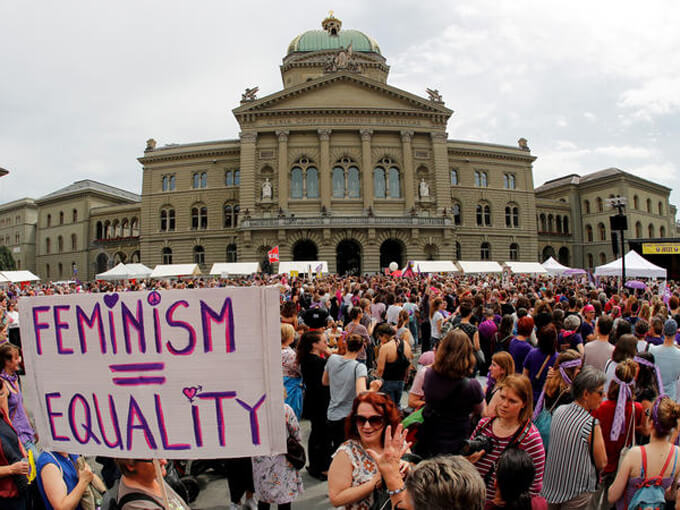Mar 11, 2020 Society
OPINION: It’s a sad thing to realise the ideology you once defined yourself by no longer holds the same urgent pull.
?This piece originally appeared on RNZ and has been shared with permission.
Like many women my age, I was introduced to feminism in my late teens through the infinite blue scroll of Tumblr. Dominated by other highly-strung youngsters prone to cancelling people for minor transgressions, it was an imperfect place to hone political praxis. But the seething anger of thousands discovering the extent of women’s oppression made for a chaotic, passionate and boundary-pushing realm of ideas.
Tumblr’s not what it once was, and neither is the women’s movement. Feminism in 2020 is scrubbed clean, dolled up and wearing a $100 t-shirt that says ‘Yass Queen’ in pink italics. The once derisive label “feminist” is now used to sell everything from dating apps to sex toys. But its current mainstream appeal masks the fact that the movement has no momentum, no goals and no new ideas.
“Choice feminism”, in which every decision a woman makes is virtuous and beyond scrutiny, has ground the movement to a halt by trapping feminists in a self-defeating loop of the empty word “empowerment”. My choice to wear makeup that makes me more conventionally attractive, my choice to take my husband’s name, my choice to take on the bulk of the childcare responsibilities – in an earlier age, such decisions would be seen as conforming to oppressive societal expectations. Today, it is sanctimoniously branded as “liberation.”
It’s what I choose and therefore it’s empowering, despite conforming to oppressive societal expectations.
Rather than shaking off the shackles of patriarchal values, we’re bound to them ever more tightly under the guise of inclusion. Feminists once rejected the notion of beauty as a woman’s only worth, now they insist all women are beautiful.
People are so fixated on seeing women in positions of previously unheld power (First female president! First Marvel movie with a female lead! First all-female paramilitary death squad!) that they fail to consider whether such power should be held by anyone.
The intoxicating thrill of representation, the hint of your own potential for greatness in an inspiring figure that looks like you, tends to blind us to the faults of the system being led by said figure. New Zealand has had three female leaders, a huge number for a young democracy, and none of them managed to shift the country’s staggering rates of domestic violence.
The problems with today’s feminist movement are inseparable from capitalism’s insatiable need to co-opt and commodify political energy. “Feminists should end our dangerous liaison with marketisation,” American theorist Nancy Fraser warned in 2012, as though foretelling the sea of Frida Kahlo pins and “Smash the Patriarchy” t-shirts and clitoris-shaped necklaces that would flood the market in the coming years.
Repulsively childish portmanteaus have elevated minor moments of social dissonance to the forefront of the discourse – manspreading, mansplaining. It’s personal branding rather than revolutionary rhetoric, and the inflation of personal grievances over structural oppression has given way to an entirely self-absorbed form of feminism.
This week’s onslaught of tweets from (overwhelmingly white) American women possessed by the vengeful ghost of Hillary Clinton, announcing they’re switching their support from Elizabeth Warren to Joe Biden to spite the ‘Bernie bros’ they accuse of misogyny, encapsulates the problem perfectly. Ignoring that the ailing Biden will lose soundly to Donald Trump, these women are making yet another empowering choice: denying women in more desperate circumstances the liberation of universal healthcare, free education and a humane immigration system.

Feminism might not be dying, but it is very sick. The movement has splintered along generational fault lines, with Second Wavers unable to reconcile the physical nature of their political triumphs – birth control, abortion rights, sexual freedom – with the introduction of transgender women into the sisterhood. Meanwhile millennials and Gen Z are turning away from feminism in favour of a greater affinity with socialism, a mass awakening in class consciousness bringing to light that there are other barriers to human flourishing that mean women will only ever be as free as the poorest among us.
If older women are peeling away in favour of radical transphobia and younger women see the movement as shallow and irrelevant, the only feminists left will be those comfortable few guided by their own self-interest rather than any desire for tangible change.
The way forward can only be for feminism to become more challenging, less comforting and a whole lot uglier. No more coddling women so they never have to question their choices, no more celebrating figureheads at the expense of collective action, no more Handmaid’s Tale costumes please god I’m begging you.
The movement would benefit enormously from more acknowledgement of the existential anguish of womanhood (something the abrasive American writer Andrea Long Chu successfully captured while documenting her transition) rather than an insistence we’re all queens who can do no wrong.
There is no perfect feminism. Everything we do is a massive push towards a goal that still seems unattainably distant. It has to go “too far”, it has to demand radical change on a political and societal level, it has to try things that are unpopular in order to overcome the inevitable pushback.
Decent society has grown far too comfortable with feminism, and feminism in turn has grown weak and self-satisfied. It’s time to take off our pussy hats, put down our Nasty Woman mugs and start genuinely repulsing people once more. Maybe then we’ll actually get something done.
*Sophie Bateman is a New Zealand journalist currently based in London.
This piece originally appeared on RNZ and has been shared with permission.






